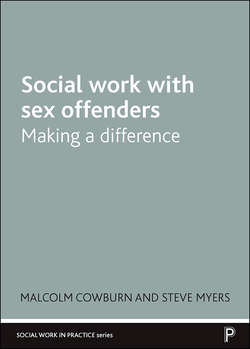Social Work with Sex Offenders

Реклама. ООО «ЛитРес», ИНН: 7719571260.
Оглавление
Cowburn Malcolm. Social Work with Sex Offenders
Contents
List of tables and figures. Tables
Acknowledgements
Chapter 1 Introduction: constructing sex crimes and sex offenders. Introduction
Values and terminologies
Underpinning value base of the book
Naming the person committing sexual harm
Naming the person harmed by sex offences
Naming acts of sexual harm
Social worker identities
Author identities
The influence of the news media: seeing through the folk devil and the moral panic
Understanding denial
Worker denial
Societal denial
Offender denial
Recognising the emotional impacts of working with sex offenders
Physical resilience
Interpersonal abilities to engage positively in human relationships
Professional capacities to observe, to interpret and to act
Race, ethnicity and social work with sex offenders: towards confident social work practice
Structure of book
Summary
Notes
Chapter 2 Understanding sex crimes and sex offenders. Introduction
A note on epistemology
Victim perspectives
Understanding sex crimes. Sociological understandings
Identities: problematic men, invisible women and the young sex offender
Understanding risk
Understanding desistance
Theological understandings
The law
Biomedical understandings
Understanding sex offenders
Psychologically informed understandings of sex offenders
The female sex offender
The ‘juvenile’ sex offender
Summary
Notes
Chapter 3 Penal responses to the sex offender. Introduction
Understanding punishment
Sentencing the sex offender
Retributive responses
Consequentialist responses
Therapeutic correctional programmes in prison and in the community
Statutory (licence) supervision
Surveillance and public notification
The registration process
Public notification of registered sex offenders
Multi-Agency Public Protection Arrangements
Communicative responses: the challenge of restorative justice
Civil law
Civil orders to prevent offending
Civil court action to offer reparation to victims
Summary
Note
Chapter 4 Working together: policy into practice. Introduction
Safeguarding
Safeguarding adults
Making a safeguarding enquiry
Safeguarding children and young people
Multi-Agency Safeguarding Hub
Developing public safety. Multi-Agency Public Protection Arrangements
Multi-Agency Public Protection Arrangement categories and levels of management
Sharing information
Child sex offender disclosure
Multi-Agency Public Protection Arrangement risk assessment and planning
Multi-Agency Public Protection meetings
Multi-Agency Risk Assessment Conference
Impact of Multi-Agency Public Protection Arrangements
When multi-agency working fails: child sexual exploitation
Summary
Notes
Chapter 5 Social work assessment of sex offenders. Introduction
Social work assessment
Approaches to social work assessment
Values and attitudes
Risk assessment of sex offenders
Actuarial prediction
Using assessment tools
Structured assessment tools
Physiological assessments
Assessing risk to whom?
Conclusion
Summary
Note
Chapter 6 Social work interventions. Introduction
The use of the self in interventions
Interventions: modes of delivery
Psychodynamic theory
Cognitive behavioural approaches
Risk, Need and Responsivity
Relapse Prevention
The Self-Regulation Model
The Good Lives Model
Mindfulness
Strengths-based approaches
Multisystemic Therapy
Engaging with families and communities
Which intervention?
Summary
Note
Chapter 7 Developing reflexive and reflective practice with sex offenders. Introduction
Knowledge is both embodied and social (as well as emotionally and intellectually influenced)
Knowledge is subjectively mediated
A reactivity element (the tools used to discover knowledge influence what is found)
Knowledge is created interactively (influenced by the specific situation)
Values, rights and reflexivity
Conclusion
References
Отрывок из книги
List of figures and tables
Acknowledgements
.....
We suggest that worker denial (of abuse, of harm to children, vulnerable adults and to self) may be rooted in both the anticipation and the actuality of direct work. It has two dimensions: cognitive and emotive. Cognitively, some social work assessments may ignore signs of abuse and trauma or reinterpret them. Emotively, denial represents a failure to recognise the emotional impact of the work. Listening to and/or reading graphic descriptions of sexual harms inflicted upon victims, children and adults is an intellectually and emotionally challenging task (see later). Perhaps the most serious consequence of worker denial is that victims may be left in vulnerable situations and offenders and offending may be ignored.
Societal denial of sexual offending is the failure of governments to recognise the extent of sexually harmful behaviours in the wider population and the harmful impacts of such crimes on victims, families and communities. Cohen (2001, p 1) identifies three forms of denial: literal denial (nothing happened), interpretive denial (something happened but it is not what you think) and implicatory denial (what happened was not really bad and can be justified). A common aspect to all three forms is:
.....